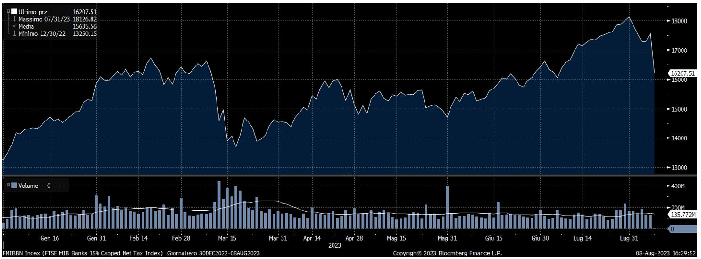What’s Hot – Extra-taxation on the “windfall profit” of the Italian banks: a lightning bolt, but not out of the blue.
The tax on banks’ extra-profits, which was discussed in the spring and then seemed to have been shelved, has bluntly returned, amid a holiday atmosphere.
The world of Italian banks is in turmoil, but avoids, for now, “official statements”, waiting for the law draft to be published in the “Official Gazette” and subsequently converted into law by Parliament within 60 days. Considering that Parliament is already on holiday and will reopen in early September, there is time to think about it.
On August Monday 7th, shortly after the launch of the new tax measure by the Council of Ministers, the Minister of Economy Giancarlo Giorgetti, who in the past reminded the banks on the need to be more generous in the remuneration of customers’ deposits, was not present at the “press conference”, and the measure was illustrated by Deputy Prime Minister Matteo Salvini.
The extra taxation is foreseen, at present, for 2 years, 2022 and 2023, which are clearly “rich” for credit institutions, especially at the “interest margin” level, while it is not clear whether the “tax cut” will have a structural and definitive nature.
Foreign Minister and Deputy Prime Minister Antonio Tajani also spoke on the subject: “It is not a measure against banks, but a measure to protect families and all those who have found themselves in difficulty for the payment of mortgages”.
The new tax, retroactive from 1st January 2022, places on the Italian banking system, after a decidedly flourishing 1st part of 2023, a significant but bearable additional tax burden, which mirrors what was decided at the beginning of the year by the Spanish Government. Between February and March, Santander, Bankinter, CaixaBank, Sabadell, Unicaja, and the all other Iberian banks paid into the state coffers about 3 billion euros of “windfall profit tax” (tax on extra profits).
In Italy, although it is still difficult to make accurate predictions, the estimated tax revenue should be between 2 and 3 billion euros, as reported today by daily newspapers1, mostly citing “government sources”. The tax levy will be 40%, however, not on “profits in general”, but on extra-profits made in 2022 and 2023 and accrued as “interest margin”, i.e., those earnings resulting from the differential between “passive” interest earned on deposits and “interest” paid by customers on their obligations to the banks.
The new extra-profit levy will be calculated on interest margin that in 2022 exceeded those of 2021 by at least 3% and, for 2023, by at least 6% those of 2022, with a limit of 25% of the value of shareholders’ equity at 31.12.2022 and 0.1% of total assets.
The top 5 national banks, Intesa-Sanpaolo, Unicredit, Bper, Banco Bpm and BMPS, achieved an increase in interest margin in 2022, compared to 2021, of around 4 billion euros, mainly due to the rate hikes decided by the European Central Bank (ECB), which led banks to immediately adjust the rates applied to loans granted to customers, but certainly not those paid to depositors, stubbornly left at zero circa.
In the 1st half of 2023 the same 5 banks marked strong increases in net interest income, estimated at around +55% compared to the same period of 2022, thus creating a suitable and much wider base to be subject to the new “Robin Hood tax”.
- Banks will be “forced” by pressure from the media, competition, and customers, to better remunerate cash deposits;
- The phase of rate hikes by central banks, including the European one, will probably be over in the coming months;
- Clients will likely continue to “dry up” the liquidity left on “unpaid” demand deposits in favour of more favourable opportunities, and this will induce banks to take “liquidity retention” actions based on the recognition of better interest.
Conclusions: the reaction of the market on August 8th with price losses of Italian bank listed shares around -8% appears disproportionate, given that the measure will affect the income statement only for 2 years and with peculiar impact in 2023.
In addition, the new tax “tells us and confirms” the Italian banking sector as “healthy” and, we feel like saying, attractive stock market for the low valuation level compared to the historical ones and a return from dividend high, above 4%.

Source: WisdomTree, Bloomberg, data as of 08 August 2023. FMIBBN is for FTSE MIB Banks 15% Capped Net Tax Index, which tracks the performance of FTSE MIB Index. Historical performance is not an indication of future performance, and any investments may go down in value.
Source
1 Source: Corriere della Sera, Il Fatto Quotidiano, La Repubblica, Il Sole 24 Ore, Bloomberg,
2 Source Bank of Italy, Italian Banking Association (ABI)

